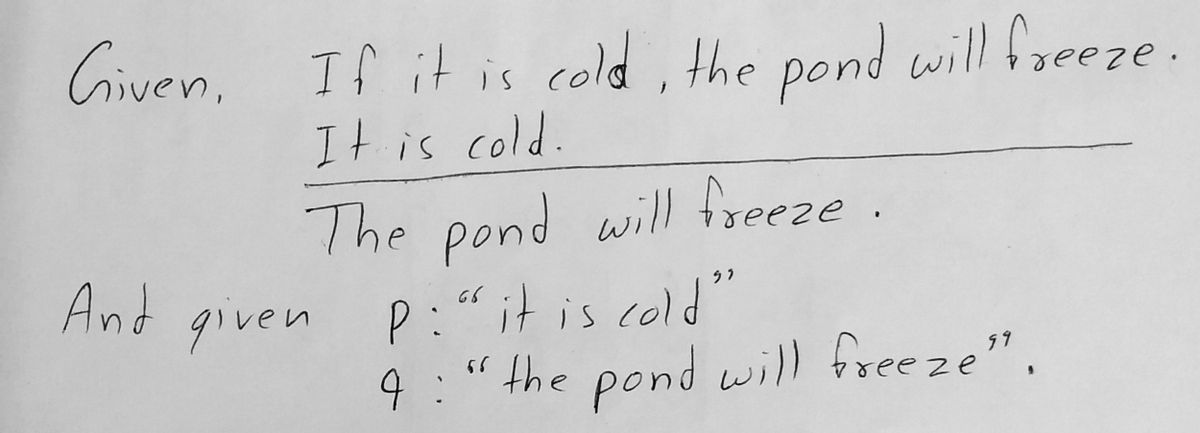Decide whether the argument is valid or a fallacy, and give the form that applies. If it is cold, the pond will freeze. It is cold. The pond will freeze. Let p be the statement "it is cold," and q be the statement "the pond will freeze." The argument is by [(pq) ^ q]→→ P, - [(p →q) ~p] → ~q, [(p →q) ~q] →→ ~P, ... [(p →q) ^ (q→→ r)] → (p → r), [(p →q) ^p] → 9, [(p ^ q) Ap] →q, or
Decide whether the argument is valid or a fallacy, and give the form that applies. If it is cold, the pond will freeze. It is cold. The pond will freeze. Let p be the statement "it is cold," and q be the statement "the pond will freeze." The argument is by [(pq) ^ q]→→ P, - [(p →q) ~p] → ~q, [(p →q) ~q] →→ ~P, ... [(p →q) ^ (q→→ r)] → (p → r), [(p →q) ^p] → 9, [(p ^ q) Ap] →q, or
Advanced Engineering Mathematics
10th Edition
ISBN:9780470458365
Author:Erwin Kreyszig
Publisher:Erwin Kreyszig
Chapter2: Second-order Linear Odes
Section: Chapter Questions
Problem 1RQ
Related questions
Question
100%
![Decide whether the argument is valid or a fallacy, and give the form that applies.
If it is cold, the pond will freeze.
It is cold.
The pond will freeze.
Let p be the statement "it is cold," and q be the statement "the pond will freeze."
The argument is
by
[(pq) ^ q]→→ P,
-
[(p →q) ~p] → ~q,
[(p →q) ^ (q→→r)] → (p → r),
[(p →→q) ~q] →→ ~P,
[(p →q) ^p] → 9,
or
[(pq) Ap] →q,](/v2/_next/image?url=https%3A%2F%2Fcontent.bartleby.com%2Fqna-images%2Fquestion%2F08f2eade-e778-42d7-8614-89fa38e265bd%2F28926466-7968-4fb1-afd2-6be0722d372b%2Fqhwjp_processed.jpeg&w=3840&q=75)
Transcribed Image Text:Decide whether the argument is valid or a fallacy, and give the form that applies.
If it is cold, the pond will freeze.
It is cold.
The pond will freeze.
Let p be the statement "it is cold," and q be the statement "the pond will freeze."
The argument is
by
[(pq) ^ q]→→ P,
-
[(p →q) ~p] → ~q,
[(p →q) ^ (q→→r)] → (p → r),
[(p →→q) ~q] →→ ~P,
[(p →q) ^p] → 9,
or
[(pq) Ap] →q,

Transcribed Image Text:Decide whether the argument is valid or a fallacy, and give the form that applies.
If it is cold, the pond will freeze.
It is cold.
The pond will freeze.
Let p be the statement "it is cold," and q be the statement "the pond will freeze."
The argument is
by
or
modus tollens.
reasoning by transitivity.
modus ponens.
disjunctive syllogism.
Expert Solution
Step 1

Trending now
This is a popular solution!
Step by step
Solved in 3 steps with 2 images

Recommended textbooks for you

Advanced Engineering Mathematics
Advanced Math
ISBN:
9780470458365
Author:
Erwin Kreyszig
Publisher:
Wiley, John & Sons, Incorporated

Numerical Methods for Engineers
Advanced Math
ISBN:
9780073397924
Author:
Steven C. Chapra Dr., Raymond P. Canale
Publisher:
McGraw-Hill Education

Introductory Mathematics for Engineering Applicat…
Advanced Math
ISBN:
9781118141809
Author:
Nathan Klingbeil
Publisher:
WILEY

Advanced Engineering Mathematics
Advanced Math
ISBN:
9780470458365
Author:
Erwin Kreyszig
Publisher:
Wiley, John & Sons, Incorporated

Numerical Methods for Engineers
Advanced Math
ISBN:
9780073397924
Author:
Steven C. Chapra Dr., Raymond P. Canale
Publisher:
McGraw-Hill Education

Introductory Mathematics for Engineering Applicat…
Advanced Math
ISBN:
9781118141809
Author:
Nathan Klingbeil
Publisher:
WILEY

Mathematics For Machine Technology
Advanced Math
ISBN:
9781337798310
Author:
Peterson, John.
Publisher:
Cengage Learning,

